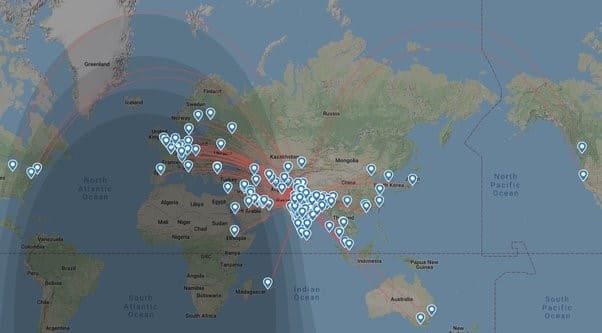



Around six to eight weekly flights of Pakistan International Airlines (PIA) will be impacted owing to India's closure of its airspace to all aircraft owned and operated by Pakistani entities — including military planes — in a direct response to Pakistan’s decision last week to bar all flights owned and operated by Indian carriers from its skies.
The tit-for-tat move comes amid escalating tensions between the two nations after the deadly Pahalgam terror attack that killed 26 people.
According to flight data from International Air Transport Association's (IATA) summer schedules, Pakistan International Airlines had taken approval to fly four weekly flights from Islamabad to Kuala Lumpur, two weekly flights from Lahore to Kuala Lumpur, and two weekly flights from Lahore to Seoul, these flights will be impacted due to the Indian airspace ban.
While theoretically India’s huge geographical territory is expected to hurt the Pakistani carrier as a complete ban will force Pakistan-originating flights to take large detours to destinations like Colombo, Kuala Lumpur, Dhaka, Thailand and Hanoi, but most international flights from Pakistan fly to countries in the middle east including the United Arab Emirates, Saudi Arabia, Oman, Qatar, Kuwait, Iran, Iraq and Egypt.
 Impact of Indian Airspace closure on Pakistani airlines
Impact of Indian Airspace closure on Pakistani airlines
According to aviation industry insiders PIA's Kuala Lumpur flights have been avoiding the Indian airspace since the Pahalgam terror attack on April 22. They are using the airspace in China, Laos and Thailand to reach Kuala Lumpur in Malaysia.
According to aviation analytics firm Cirium, PIA flies about 308 international flights per week and more than 80 per cent of them are to the cities in West Asia. These flights to West Asia do not use the Indian airspace.
 Impact of Pakistani Airspace closure on Indian airlines
Impact of Pakistani Airspace closure on Indian airlines
PIA on April 30 also has announced the suspension of all flights to and from Gilgit, Skardu, and other destinations in the region. The abrupt decision has sparked concern among local residents and tourists who heavily rely on air travel to access these remote, mountainous regions.
Gilgit and Skardu serve as critical gateways to the northern territories, which have limited road infrastructure and challenging terrain. The sudden halt in service presents significant logistical challenges, with land routes often unreliable due to weather conditions, long travel durations, and poor road quality.
PIA has not issued an official explanation for the suspension, but sources within the aviation sector suggest the move is part of a broader restructuring effort. The Pakistani national carrier has been under severe financial stress, prompting it to cut back on less profitable or operationally demanding routes. The suspension is expected to impact not just passenger mobility but also the transport of goods, essential supplies, and tourism-driven economic activity in the affected areas.
India issued a NOTAM (Notice to Air Missions) on April 30, stating: "Indian airspace not available to Pakistan registered aircraft and aircraft operated or leased by Pakistan airlines. These include military flights."
This escalation follows the brutal terrorist attack in Pahalgam, Jammu and Kashmir, where 26 tourists were killed by terrorists with links to Pakistan.
Pakistan's April 24 closure of its airspace to Indian flights has hit some 600 west-bound international flights of mostly Air India and IndiGo in the first five days since the airspace closure. The forced diversions that have resulted has led to around 120 flights being forced to make an extra stop to refuel when flying to Europe, North America and other destinations that involve overflying Pakistan, data shared by online travel agents and flight tracking platforms with Moneycontrol showed.
Discover the latest Business News, Sensex, and Nifty updates. Obtain Personal Finance insights, tax queries, and expert opinions on Moneycontrol or download the Moneycontrol App to stay updated!
Find the best of Al News in one place, specially curated for you every weekend.
Stay on top of the latest tech trends and biggest startup news.